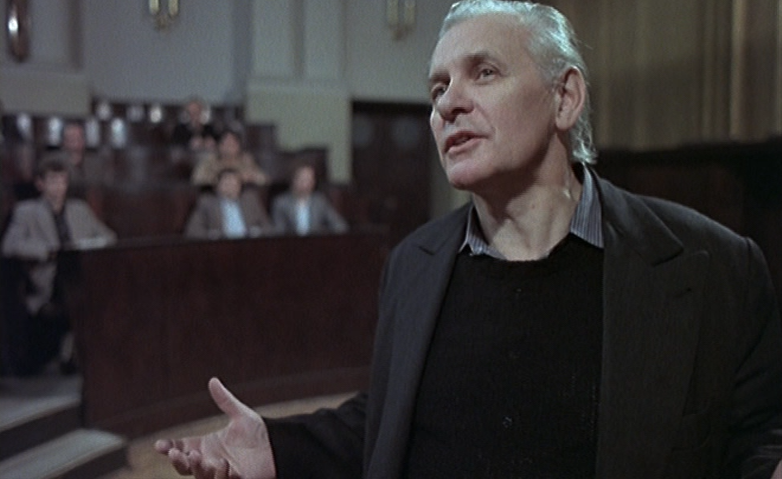In any case, leave your imitative Gwyneth Paltrow movie at the Sliding Doors (1998); writer-director Krzysztof Kieślowski’s original Blind Chance [Przypadek] (1981) is cinema of possibilities crafted in a triangular structure. Branching from separate fates or happenstances to one man on a train platform in Łódź, Poland, the film grasps at the national identity and political unrest of the late 1970s-early 1980s that defined Kieślowski’s earlier approach to documentary while also vividly forecasting the emotional character studies that he would favor when working abroad in the early 1990s. Matching the ambition of the more widely seen Three Colors Trilogy: Blue, White, Red (1993-1994), Blind Chance similarly succeeds as a gripping metaphysical drama intelligently interwoven into the climate under the country’s authoritarian regime.
The intricate long takes and wide-angle close-ups yield an equally intricate and politically inquisitive mood that dominates the first two contingencies that ultimately resulted in its six-year censorship under Poland’s martial law until an official premiere in 1987. Its reminiscences of a bygone era and disorienting traversal back-and-forth through time foster a unique identity further reflected in the performance(s) of young medical student Witek (Bogusław Linda) at three moral junctures. His sentimentality is the heart of the film, which bursts forth with absolute clarity in its most desperate final hour.
The introductory six minutes, however, are an abstract of premonitions and longings that factor into the impending decisions and chance encounters in Witek’s life. This overture, marked by the heavy-hearted baroque sounds of strings, oboe, and harpsichord in Wojciech Kilar’s theme, is the film’s most creative conceit, propelling it beyond any hangups in execution. While the experimentally microcosmic intro may be potentially alienating to a first-time viewer, the vignetted design of Blind Chance consistently reestablishes its essential urgency.
As Witek is first seen scurrying through the Łódź station to catch the train to Warsaw, he pulls himself aboard from the caboose door at the last possible second. Immediately, he encounters an old Communist lecturer named Werner (Tadeusz Łomnicki), who strongly personifies the film’s fateful theme. Kieślowski wishes to provide multiple answers to the entrenched, eternal question about the meaning of life, viewing it as a spectrum of possibilities that are both within and removed from one’s control. In a class lecture Witek attends, Werner riffs on the subject while alluding to Marx: “Every generation has need of light…. Early in life, it brings joy, as light seems near, within reach. At life’s end, it brings bitterness, as the light has grown distant. Life without this hope, without this bitterness wouldn’t be worth living.” This philosophy seeps into Witek’s collective consciousness, as part one is defined by a radical yet wandering idealism that is misplaced in his reunion and entanglement with teenage love Czuszka (Boguslawa Pawelec), who’s seen with Witek alongside a train, curiously enough, in the initial six-minute abstract.

Werner’s words echo through the second scenario in which the Warsaw train evades him by mere seconds, and a scuffle ensues with a restraining officer. Subsequently sentenced to 30 days of community service, Witek clings to a more pious existence and finds a mentor in Stefan (Adam Ferency), a disabled priest, who at once appears to be a spiritual inversion of Werner, tethered to certain fate and judgment before God. During a cramped student protest meeting that harnesses a similar vigor and visually evokes the opening scene of Antonioni’s Zabriskie Point (1970), Witek bumps into his childhood friend Daniel (Jacek Sas-Uhrynowski), who’s also seen in the introduction moving away from home as a young boy. Now in the company of his older sister Vera (Marzena Trybała), the three reconnect unusually quickly, lamenting the loss of family members; in time of need, Witek discovers romantic interest and inspiration in Vera’s strangely intimate knowledge of his past and future. She, too, acts as a metaphorical reincarnation or counterpart to a character in Witek’s first journey.
In the third and final brush with the departing train, by fate or chance, Witek fails to catch it and falls back into his former medical studies at the hospital, seeking the affection of colleague Olga (Monika Gozdzik), with whom he begins a family. Kieslowski quietly manipulates the notions of a happy ending, though, suggesting that Witek’s lack of political and social involvement on either side — the stark Communism of the first scenario or the religious, anti-Communist views of the second — is a just as life-altering and potentially devastating as devoted activism (see: the butterfly effect… just not the Ashton Kutcher movie).
Kieślowski’s best work values synchronicity through shared moments between people as representative of something much larger and ineffable in the universe. These emotional sparks could be characterized by almost-imperceptible aberrations in editing. These micro-jump cuts are tears in the temporal fabric of time that reinforce the film’s sense of the infinite. The Double Life of Véronique (1991) further explores metaphysical themes by juxtaposing two visions of a budding young girl’s life: one as a distinctive opera singer and another as a modest music teacher. Blind Chance‘s hypnotic, precursory, influential design is not so different. Not only demonstrating the director’s art of conditional time — what may have happened or what might happen — as inherent to the cinematic medium, the film is a perfect foreshadowing of his later output, not unlike its visual overture in relation to its entire narrative trajectory.
- Blind Chance screens FREE at the Cinematheque on Fri, Apr 3 (7:00p), as part of the ‘Masterpieces of Polish Cinema’ series

2 Comments